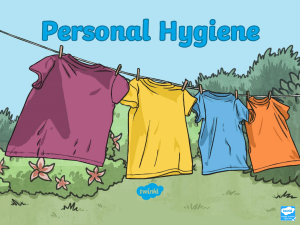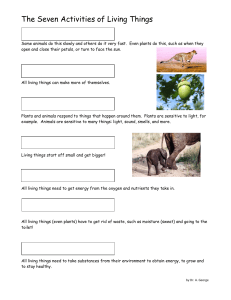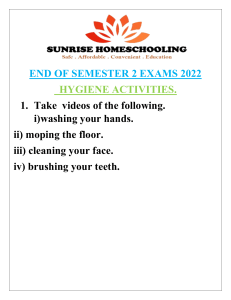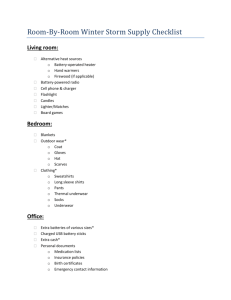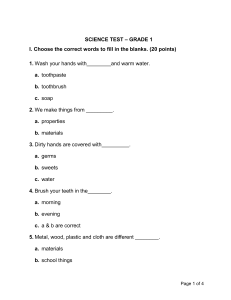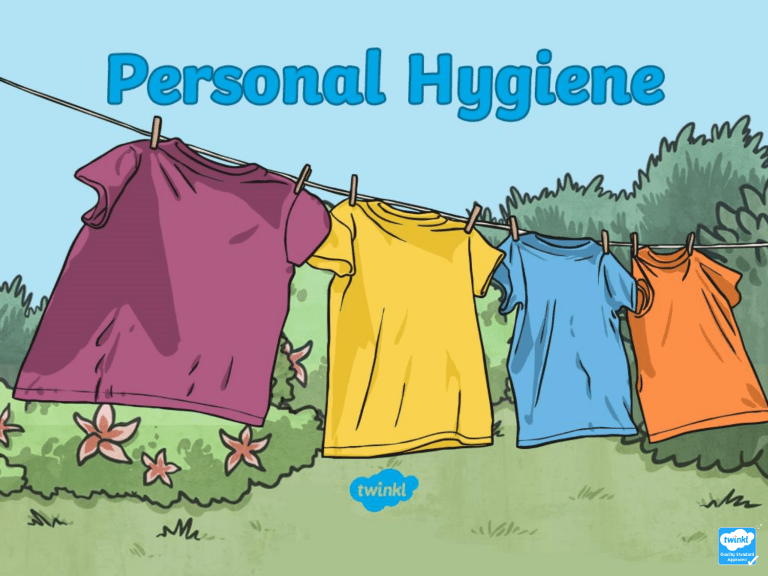
What Is Personal Hygiene? Personal Hygiene is how we look after our bodies. Keeping ourselves clean and tidy makes us feel better about ourselves and also keeps us, and those around us, healthier! What Does It Include? Can you think what might be included in personal hygiene? Discuss. Brushing our teeth; Washing our hands; Wearing clean clothes; Showering or bathing regularly; Keeping fresh and clean; Minimising the spread of germs where we can! Brushing Our Teeth It is recommended that we brush our teeth twice a day, for around 2 minutes. We should visit the dentist every 6 months for a check up. Brushing properly removes plaque which can cause cavities, tooth ache, gum disease and even our teeth falling out! It also gives us lovely fresh breath! Washing Our Hands Washing our hands is one of the simplest ways we can keep ourselves and those around us healthy. Think about everything your hands touch in a day… door handles; stair banisters; toilet flushers. Think about how many other people have touched these things too! Dirtier Than a Toilet Seat? A study from a University in Arizona claimed there were things that we touch that are actually dirtier than a toilet seat! All of these things were found to have more bacteria and germs than a household toilet seat! When Should We Wash Our Hands? When they are dirty; It’s best to keep your nails neatly trimmed and clean. And try not to bite them! Before we eat or help prepare food; After petting animals; After using the toilet; After we sneeze, cough or blow our noses; Before and after visiting someone who is unwell. Washing our hands with clean, warm water and soap will kill off the germs and keep our hands clean. Showering or Bathing Regularly As we get older and start to experience puberty it becomes important to shower and bathe more regularly. Both boys and girls bodies change during puberty, but one of the main changes that we all experience is that our sweat glands grow and start to produce more sweat. Hormones During puberty, hormones kick in - different hormones for boys and girls - but they can both cause oily skin and more sweat. If we don’t wash regularly we are more likely to get spots and have BO (body odour). Remember, sweat doesn’t smell…it is stale sweat that produces the body odour. You can keep yourself fresh by remembering to use deodorants but this is not a substitute for showers or baths! Clean Clothes It is really important to wear clean clothes. If we wore the same thing all the time they would get dirty and start to smell. Even if it is the most fashionable thing you own…it will still need to be washed! You don’t need to wear fresh, clean clothes every day, but if, for example, you wear the same trousers to school for a few days - make sure that you take them off as soon as you get home and let them air out for a while! Don’t Forget Your Underwear! Underwear is different. Underwear covers the parts which can get the most sweaty. This includes socks! Our feet are covered in sweat glands and can get sweaty and smelly as we’re on our feet a lot. Remember to change your socks and underwear every day! And put the dirty ones in the dirty washing basket - don’t leave them on your bedroom floor. Yuck! Keeping our noses clean The only acceptable way of cleaning our noses is with a tissue. Not fingers or sleeves! Bring a small packet of tissues with you to school. If you have a really bad cold, they can even stay at your desk! However: dirty tissues must be binned or flushed down a toilet straight away; don’t share used tissues with others; wash your hands after using a tissue. Other ways of preventing the spread of germs Covering our mouths when we sneeze or cough. Not sharing water bottles, etc. Not coming to school if you have a stomach bug and have been sick or have diarrhoea. Try not to touch our eyes, nose and mouth too much.
